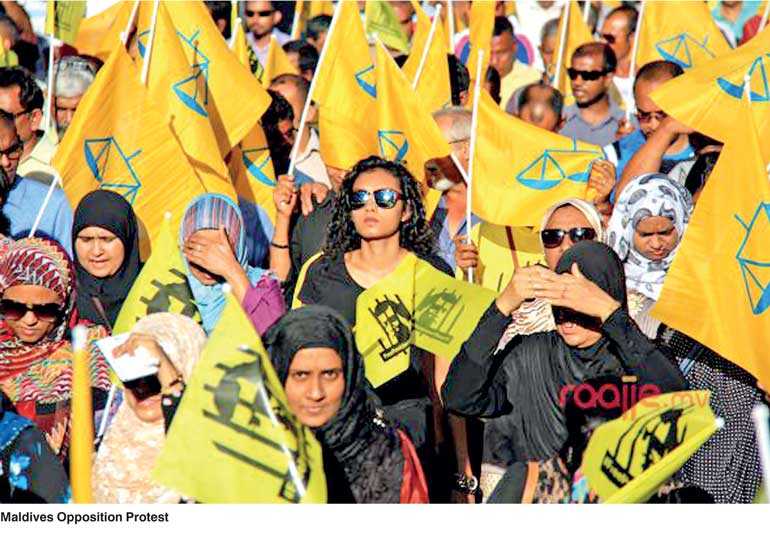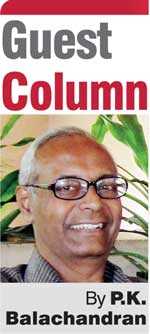Thursday Feb 19, 2026
Thursday Feb 19, 2026
Saturday, 23 June 2018 00:19 - - {{hitsCtrl.values.hits}}

The ongoing confusion in the ranks of the Maldivian opposition, barely three months before the presidential election, works to the advantage of the incumbent President and candidate of the Progressive Party of the Maldives (PPM), Abdulla Yameen.
The presidential contest will be between an incumbent who places economic development and social welfare above the norms of Western-style democracy, and a medley of opposition parties which wants restoration of democracy first and foremost.
But the key requirement for victory is unity in thought and action – an attribute which the ruling PPM under Yameen has displayed and which the opposition appears to be lacking now in the critical last few months before the contest.
Opposition in disarray
Presently, the opposition is in disarray, in contrast with what one saw in March 2017, when the Maldivian Democratic Party (MDP) led by Mohamed Nasheed and Maumoon Abdul Gayoom; the Jumhoory Party (JP) led by Gasim Ibrahim; and the Islamist Adhaalath Party (AP) led by Sheikh Imran Abdulla signed a “historic declaration” to work together to restore democracy in the Maldives. The grouping called itself the “Reform Alliance”.
The four political heavyweights resolved to protect ownership of the land, sea and natural resources; find a solution to the political discord afflicting the country; safeguard civil and political rights arrogated from citizens; and ensure elections held in the Maldives are free and fair, and in which, candidates of political parties are allowed to contest.
The alliance was to put up a common candidate against Yameen in the September 2018 presidential election.
Thirst for individual power
Everything appeared to be working well for the opposition in the subsequent months. It spoke with one voice, kept up the media blitz against the Yameen regime, and garnered full support for its agenda from the Western bloc and India, the regional power.
But, as it often happens in South Asian countries, as the election approached, individual ambitions and thirst for individual power got the better of collective goals. Nasheed was the first to break ranks, when he declared himself the Presidential candidate of the MDP and held a “primary” in which he was the sole candidate. As expected, he won hands down.
This was done in defiance of the law of the land, which said that he could not contest while serving a jail sentence. When he was Maldivian President from 20108 to 2012, he had abducted a criminal court judge when abduction is an act of terrorism as per a 1990 law. He was sentenced for 13 years of which he had served only a few years before being allowed to go on medical parole to the UK. After getting asylum in the UK while he was there, Nasheed refused to come back and complete his sentence. He has been leading the MDP from the UK and Sri Lanka with a remote control.
Nasheed’s example of putting himself as the candidate was followed with alacrity by Gasim Ibrahim of the Jumhoory Party. In June, Gasim unilaterally announced that he is the presidential candidate and appointed a shadow cabinet to boot.
But the Gasim cabinet had no place for the MDP, though it had the leader of the Adhaalath Party Sheikh Imran and former President Maumoon Abdul Gayoom’s two daughters. Gayoom’s son, Faris, was made the shadow Parliament Speaker.
Gasim’s “allies” were naturally shocked and vowed not to join his proposed government. Despite its inclusion, the Adhaalath Party quickly took to Twitter to deny any agreement with Gasim and insisted that it is committed to working together with the other parties as part of the original coalition pact.
One of former President Gayoom’s top aides told the media that the 80-year-old leader (now in jail for plotting the overthrow of the Yameen regime), remains part of the ongoing talks to nominate a joint opposition candidate.
Rubbing salt into the wound
Gasim rubbed salt into the wound by saying that the names included his shadow government were picked “after considering the likelihood of the chosen ones working together after the elections”. The non-inclusion of Nasheed and the MDP is therefore a clear indication that Gasim does not think that he can work with them in a government after the election victory.
However, Gasim’s deputy, Ameen Ibrahim, tried to correct the impression by saying that the “shadow cabinet” was merely a proposal by Gasim, and that it posed no threat whatsoever to the joint efforts of the opposition alliance to field a common candidate.
Gasim’s proposal was only a contingency plan in case the opposition alliance fails to reach a consensus over the common candidate, Ameen said.
Regarding MDP’s noticeable absence from Gasim’s cabinet, Ameen cryptically said: “Gasim’s thoughts are positive about MDP’s leadership as well.” But he went on to point out that the MDP had also finalised its candidate unilaterally.
“The JP fully respects MDP’s decision and the MDP should reciprocate the courtesy,” Ameen said indicate a deep rift.
But the question as to whether Gasim or Nasheed can contest the Presidential election remains. Gasim is above the age limit (65 years) and is also a fugitive from the law. Nasheed too is absconding.
Nasheed cannot contest this time as he has many years to go before he completes his 13-year sentence. The Elections Commission has already declared MDP’s “primary” as null and void as the lone candidate was ineligible to contest for the country’s presidency.
Nature of Maldivian politics
A point that gives a clue to the nature of Maldivian politics is that neither Gasim nor Nasheed has thought of putting up another candidate to fight in their place. “It’s either me or none,” seems to be the motto. Such an attitude might result in the opposition’s handing the match to Yameen uncontested.
In India, in contrast, if a leader is unable to contest he will put up a proxy. For example, when Laloo Prasad Yadav was ousted as Chief Minister of Bihar in 1997, he made his wife Rabri Devi the Chief Minister.
Sources in Maldives say that the NDP, JP and other parties all have a number of competent leaders who can contest if the main leader is disqualified. But neither Gasim nor Nasheed would allow any others to contest. The moment somebody shows signs of ambition, he would be quashed, a source said.
The other handicap the opposition is suffering from is the absence of its top leaders in situ. While Gasim and Nasheed are in self-exile (and also “serving” a prison sentence at home) others like Maumoom Abdul Gayoom are in jail.
 Nasheed’s absence
Nasheed’s absence
The absence of Nasheed is particularly palpable because he is the quintessential agitator, a street fighter, and a youth leader. He established himself as a valiant pro-democracy agitator when he led the heroic non-violent struggle against the 30-year dictatorship of Maumoon Abdul Gayoom.
While Nasheed’s father and grandfather had used violent methods to oust Gayoom and failed, young Nasheed used non-violence and succeeded in his mission. For this, he has the support of the Maldivian youth and the media, for which, freedom is the sine qua non of existence.
Yameen’s strength
One of the reasons why there is no mass agitation against Yameen’s regime, despite its record of jailing opponents and its inability to dialogue with and win over opponents, is that Nasheed is not in the country.
Yameen’s strength stems from his ability to use power and also his accent on the promotion of economic development. His managerial talent is far superior to that of Nasheed.
“Having lived in the UK, Nasheed had modern ideas and wanted to introduce modern institutions when he was President between 2008 and 2012. But where he failed miserably was in implementation. He was more of a showman than a doer. Yameen, on the other hand, is dour and withdrawn, but has meticulously implemented whatever projects he had undertaken,” said a Yameen supporter.
Economic development vs. democracy
The 23 September presidential election will be a contest between economic development and democracy. Economic development undoubtedly has its supporters. But democracy too has a growing constituency since the 2008 revolution when Gayoom’s dictatorship was replaced by democracy.
No one can now take the Maldives back to dictatorship of the Gayoom era, even if the people are provided with good social security and full employment.
The Maldivian media, both formal and non-formal, have generally been pro-democracy and anti-Yameen. They do have an influence, given the fact that the Maldives has 100% literacy and Maldivians are inter-connected through the print and electronic media, a top of the drawer telecommunication system, and the social media.